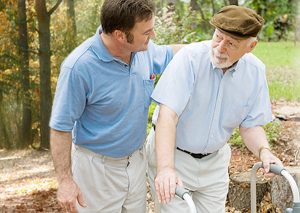Associate Care Manager Gregory Peebles returns with a talk about hidden signals of aging that need our attention. Gregory is both a Certified Senior Advisor (CSA) and Certified Dementia Practitioner (CDP) whose work focuses on helping aging adults and folks with limited independence by providing resources and support to help them discover and lead their best life. Gregory has been a part of my team for over a decade. – Charlotte
Call it self-reliance, gumption, stick-to-itiveness, or fierce independence, but most of us are very proud of this aspect of our national character. We manage ourselves and try to not bother our neighbors. We may need help, but we try to not ask for it. There’s plenty to be proud of in taking care of ourselves, but no matter how hard we try to remain staunchly independent, we ultimately need each other, and most of us don’t get much practice asking for help. Consequently, when we do need to ask, we can feel like a failure (we’re not!) and don’t want to reveal our vulnerability.
Please allow me to share three signals that your older loved one may be in need of help but not be  able to ask. Older adults embrace their independence and hate admitting they need help as much as anybody else. More often, they are told they need help. After some type of health scare (statistically, an in-home fall), a doctor or loved one gets tasked with “The Talk”. Life will be different. There will be more physician visits. There will be more caregiving. There will be less self-rule.
able to ask. Older adults embrace their independence and hate admitting they need help as much as anybody else. More often, they are told they need help. After some type of health scare (statistically, an in-home fall), a doctor or loved one gets tasked with “The Talk”. Life will be different. There will be more physician visits. There will be more caregiving. There will be less self-rule.
The defining incident, which has usually been a long time coming, may register as a shock to the adult children or other loved ones of an older adult who may be focused on their hectic lives. After the life-changing incident has occurred, everyone’s eyes are opened to what they couldn’t see before. Here are three warning signs your loved one may need your help but hasn’t asked.
- Presentation.– “Keeping Up Appearances” isn’t just a show on BBC. This is how individuals and families signal health and success in all aspects of their lives. When self-presentation declines, something is wrong. It’s that simple. Look for changes in housekeeping habits. Lack of interest in hygiene or grooming can signal depression, or a change in body mechanics. Weight loss can be because meals get forgotten, or because they are just harder to prepare. It doesn’t matter which one.
- Mood and Memory. – We’re not talking about minor lapses of judgement or awareness. Everybody has a bad day or two in a row. Everybody forgets stuff. If, however, your loved one is more irritable than usual for longer than usual, or is more emotional than usual, that’s a signal of change. Losing one’s glasses or forgetting the day of the week are not necessarily causes for alarm. Even procedural memory loss (temporarily forgetting how to do something) is more common than we think. It’s always time to talk, but it’s probably not time to call a doctor until your loved one moves from forgetfulness to inability to process events into memories…instead of where are the car keys…what are the keys for?
- Mobility.– It’s hard to ignore a body that has slowed and become harder to maintain. So don’t. When offering an elbow on the stairs just isn’t good enough anymore, it’s time to talk about the logistical changes necessary to keep your loved one as independent as they can be. Walkers, chair lifts, in-home caregivers, ride services, and a host of other options can facilitate.
Seeing these signals gives you an advantage for continued health and high quality of life for your older loved one. If your loved one lives at distance, services like those CCM, Inc. can identify and coordinates can help ease your mind and provide your loved one with just enough support to preserve their independence and their safety.
Charlotte Bishop is an Aging Life Care Advisor, Geriatric Care Manager and founder of Creative Care Management, certified professionals who are geriatric advocates, resources, counselors and friends to older adults and their families in metropolitan Chicago.



